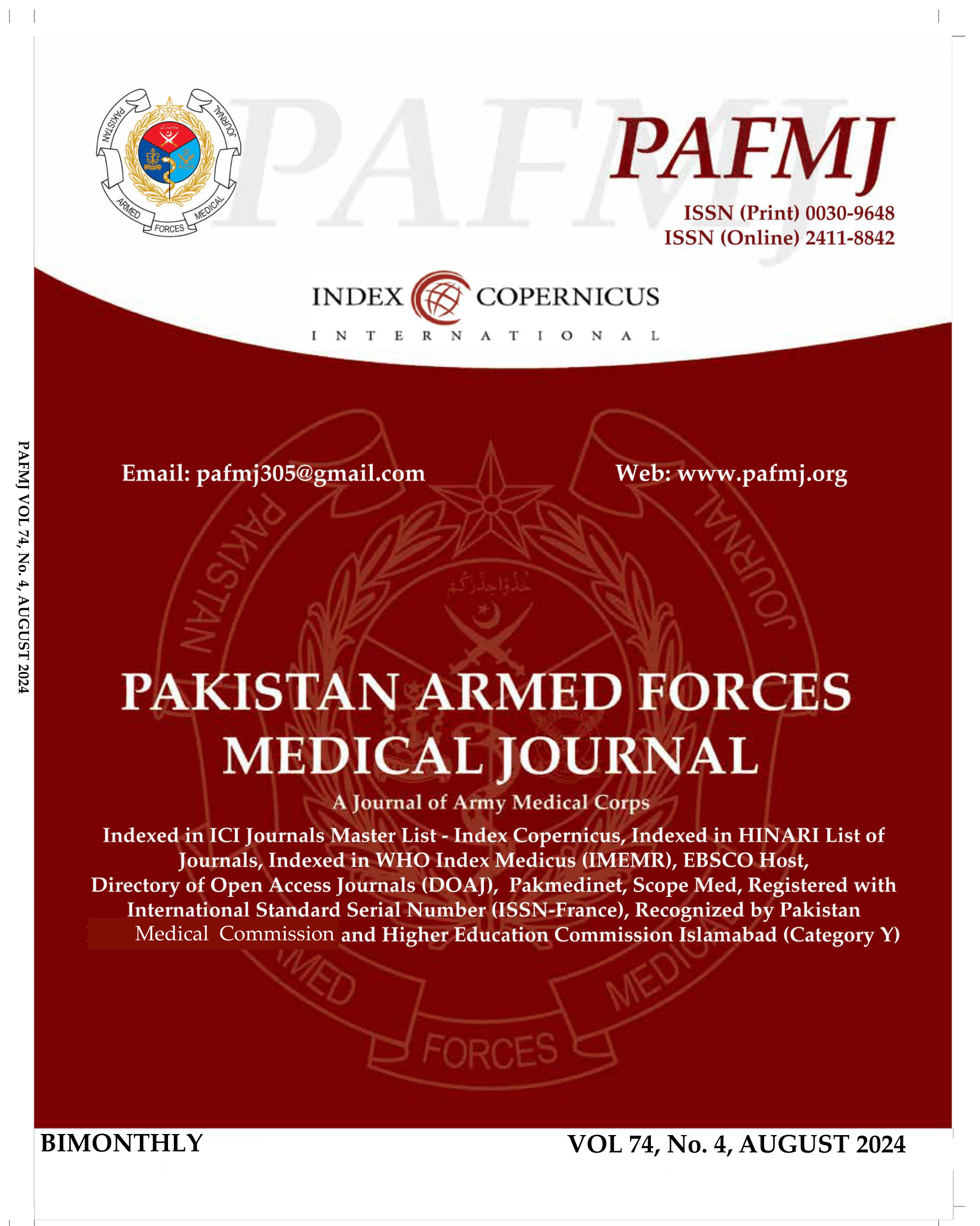Effects of Post-Operative Cognitive Dysfunction after Spinal Anesthesia between Geriatric and Middle-Aged Patients
DOI:
https://doi.org/10.51253/pafmj.v74i4.9784Keywords:
Cognitive dysfunction, Geriatric, Middle aged, Spinal anesthesia.Abstract
Objective: To compare the effects of Post-Operative Cognitive Dysfunction after spinal anesthesia between geriatric and middle-aged patients presenting for elective surgery.
Study Design: Quasi-experimental study.
Place and Duration of Study: Anesthesia Department of Combined Military Hospital, Peshawar Pakistan, from Jan to Jun 2022.
Methodology: A total of 90 patients were included in the study divided into the geriatric group (Group-A, n=45) and the middle age group (Group-B, n=45) according to ages defined. Primary variables measured were Mini-Mental State Examination pre-operatively and 12 and 24 hours after surgery for cognitive impairment.
Results: Mean age of patients was 64.56±3.85 years in the geriatric versus 38.11±3.62 years in the middle age group. The mean total MMSE score out of 30 was 24.36±1.5 in the geriatric versus 25.58±1.3 in the middle age group at the 12-hour interval (p<0.001). The score improved at the 24-hour interval but was still hampered in the geriatric Group more than the middle age group, 26.76±1.00 versus 27.36±0.74 (p<0.001).
Conclusion: We conclude that neuraxial anesthesia is associated with deterioration in logical and analytical memory both in the middle age and geriatric age group with return to full neurological function early in the middle age group
Downloads
References
Czyż-Szypenbejl K, Mędrzycka-Dąbrowska W, Kwiecień-Jaguś K, Lewandowska K. The occurrence of postoperative cognitive dysfunction (POCD)-systematic review. Psychiatr Pol 2019; 53(1): 145-160. https://doi.org/10.12740/PP/90648
Zhao Q, Wan H, Pan H, Xu Y. Postoperative cognitive dysfunction-current research progress. Front Behav Neurosci 2024 ; 18: 1328790. https://doi.org/10.3389/fnbeh.2024.1328790
Daiello LA, Racine AM, Yun Gou R, Marcantonio ER, Xie Z, Kunze LJ, et al. Postoperative delirium and postoperative cognitive dysfunction: overlap and divergence. Anesthesiology 2019; 131(3): 477-491.
https://doi.org/10.1097/ALN.0000000000002729
Berger M, Nadler JW, Browndyke J, Terrando N, Ponnusamy V, Cohen HJ, et al. Postoperative cognitive dysfunction: minding the gaps in our knowledge of a common postoperative complication in the elderly. Anesthesiol Clin 2015; 33(3): 517-550.
https://doi.org/10.1016/j.anclin.2015.05.008
Lin X, Chen Y, Zhang P, Chen G, Zhou Y, Yu X. et al. The potential mechanism of postoperative cognitive dysfunction in older people. Exp Gerontol 2020; 130: 110791.
https://doi.org/10.1016/j.exger.2019.110791
Langer T, Santini A, Zadek F, Chiodi M, Pugni P, Cordolcini V, et al. Intraoperative hypotension is not associated with postoperative cognitive dysfunction in elderly patients undergoing general anesthesia for surgery: results of a randomized controlled pilot trial. J Clin Anesth 2019; 52: 111-1118.
https://doi.org/10.1016/j.jclinane.2018.09.021
Lu W, Zhang K, Chang X, Yu X, Bian J. The Association Between Systemic Immune-Inflammation Index and Postoperative Cognitive Decline in Elderly Patients. Clin Interv Aging 2022; 17: 699. https://doi.org/10.2147/CIA.S357319
Safavynia SA, Goldstein PA. The role of neuroinflammation in postoperative cognitive dysfunction: moving from hypothesis to treatment. Front psychiatry 2019; 9: 752.
https://doi.org/10.3389/fpsyt.2018.00752
Zhang N, Liang M, Zhang D-d, Xiao Y-r, Li Y-z, Gao Y-g, et al. Effect of goal-directed fluid therapy on early cognitive function in elderly patients with spinal stenosis: a case-control study. Int J Surg 2018; 54: 201-205.
https://doi.org/10.1016/j.ijsu.2018.04.007
Ehsani R, Motlagh SD, Zaman B, Kashani SS, Ghodraty MR. Effect of general versus spinal anesthesia on postoperative delirium and early cognitive dysfunction in elderly patients. Anesth Pain Med 2020; 10(4).
https://doi.org/10.5812%2Faapm.101815
Sidhu S, Marine JE. Evaluating and managing bradycardia. Trends Cardiovasc Med 2020; 30(5): 265-272.
https://doi.org/10.1016/j.tcm.2019.07.001
Yu Q, Qi J, Wang Y. Intraoperative hypotension and neurological outcomes. Curr. Opin. Anesthesiology 2020; 33(5): 646-650.
https://doi.org/10.1097/ACO.0000000000000904
Kotekar N, Shenkar A, Nagaraj R. Postoperative cognitive dysfunction–current preventive strategies. Clin Interv Aging 2018; 13: 2267.
http://doi.org/10.2147/CIA.S133896
Zhao S, Chen F, Wang D, Han W, Zhang Y, Yin Q. et al. NLRP3 inflammasomes are involved in the progression of postoperative cognitive dysfunction: from mechanism to treatment. Neurosurg Rev 2021; 44(4): 1815-1831.
https://doi.org/10.1007/s10143-020-01387-z
Bhuiyan P, Chuwdhury G, Sun Z, Chen Y, Dong H, Ahmed FF, et al. Network Biology Approaches to Uncover Therapeutic Targets Associated with Molecular Signaling Pathways from circRNA in Postoperative Cognitive Dysfunction Pathogenesis. J Mol Neurosc 2022: 1-27.
https://doi.org/10.1007/s12031-022-02042-6
Smith P, Blumenthal J, Hoffman B, Davis RD, Palmer S. Postoperative cognitive dysfunction and mortality following lung transplantation. Am J Transplant 2018; 18(3): 696-703.
https://doi.org/10.1111/ajt.14570
Schenning KJ, Murchison CF, Mattek NC, Kaye JA, Quinn JF. Sex and genetic differences in postoperative cognitive dysfunction: a longitudinal cohort analysis. Biol Sex Differ 2019; 10(1): 1-9.
https://doi.org/10.1186/s13293-019-0228-8
Klimesch W. The frequency architecture of brain and brain body oscillations: an analysis. Eur J Neurosci 2018; 48(7): 2431-2453.
Downloads
Published
Issue
Section
License
Copyright (c) 2024 Saad Hameed, Abdul Hameed Bhatti, Shizan Hamid Feroz, Nabeel Tahir Butt, Kenan Anwar khan, Najaf Imtiaz Cheema

This work is licensed under a Creative Commons Attribution-NonCommercial 4.0 International License.















